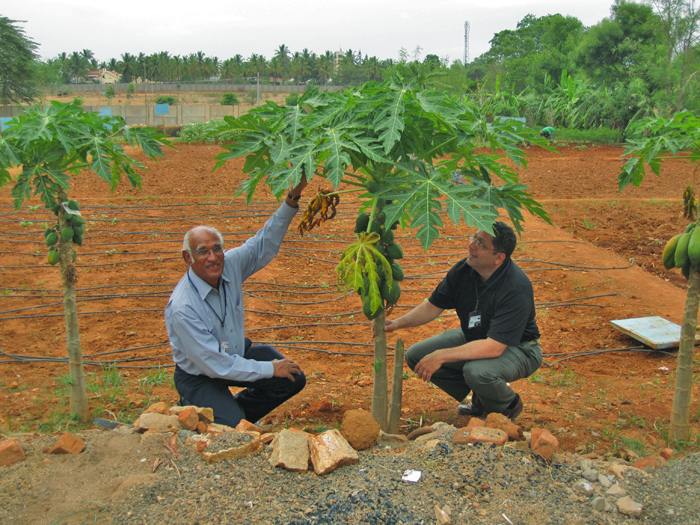Muni Muniappan wins award for work in tropical agriculture

Rangaswamy "Muni" Muniappan works to save the papaya industry in southern India. He connects researchers in developing countries. He has discovered an invasive species in Senegal and Nepal.
Because of these accomplishments and more, the Virginia Tech entomologist caught the attention of the Board for International Food and Agricultural Development. He has won the organization's 2014 award for scientific excellence.
Muniappan received the BIFAD Award for Scientific Excellence today in Des Moines, Iowa. It is presented each year by the presidentially appointed body that governs U.S. foreign assistance in agriculture.
Muniappan is director of the Integrated Pest Management Innovation Lab, a venture that works in developing countries to achieve three vital aims: minimize crop losses, increase farmer income, and decrease pesticide use. Muniappan, a longtime expert in the study of insects that benefit or harm humans, leads a multimillion dollar research portfolio of projects that includes partners from 15 American universities and 32 overseas organizations.
Muniappan discovered the papaya mealybug in Asia and helped employ biological control to eradicate it, which restored the livelihoods of thousands of farmers on the Asian subcontinent. This translated to an economic benefit of more than $1 billion over five years, according to a study published in the Journal of Crop Protection.
His discovery of the tomato leafminer (Tuta absoluta) in Senegal allowed experts to be warned so that preventive biological control measures could be taken for a pest that likely threatens all sub-Saharan tomato farmers.
Muniappan has created incentives for scientists to work together across national boundaries. He recently brought together scientists from South Asia and Central America in a conference on invasive species in Senegal.
Muniappan's achievements also include control of such pests as the pink hibiscus mealybug, the fruit-piercing moth, the red coconut scale, the banana weevil, and the Asian cycad scale. He has worked to control weeds including the Siam weed, lantana, and the ivy gourd. He has been instrumental in establishing working groups for the weeds chromolaena and parthenium within the International Organization for Biological Control.
Muniappan's career includes 36 years spent in Guam; a stint as a Fulbright Research Scholar in India; time spent as a UN Food and Agriculture Organization consultant in the Maldives, Palau, and Vanuatu; and in a visiting professorship at the University of Guyana.
An honorary member of the International Organization for Biological Control since 2010, Muniappan has published journal articles in the Journal of Economic Entomology and Annals of the Entomological Society of America.
Funded by the U.S. Agency for International Development, the innovation lab is managed by Virginia Tech's Office of International Research, Education, and Development in Outreach and International Affairs.





